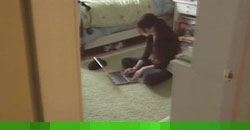


Dear FRONTLINE,
I'm a grad student who has been teaching for three years at a regional college in Oklahoma. I, too, grew up addicted to the internet (and still am, frankly). As such, I can sympathize with my students' addiction to Myspace, their cell phones, and all the other background noise that makes the college experience so disorienting.
However, I simply cannot condone the defeatist attitude of some of the teachers depicted in the program. If a students' cell phone goes off in class more than once during the semester, I remove them for the day. A third time is removal from the class entirely. Texting is instant removal, as is posting on Myspace or Facebook. And so help me if I discover they plagiarized from an online source (I use a similar website to the one featured in the program).
Yes, technology can enhance the students' learning in the classroom. But just because it is so prolific does not mean we need to turn a blind eye to the negative impacts it can have. I treat my students like adults, and I expect them to act like it. Surely this is not impossible at the high school level.
Tulsa, Oklahoma
Dear FRONTLINE,
As with television, protecting children from objectionable material on the internet is the responsibility of the parents. Children, especially teenagers, do stupid things. Their naivet gets them into trouble, and, too often tragedy results. Troubled teenagers do commit suicide, and commit heinous crimes. It is the responsibility of the parents to ensure that things like that do not happen. For better or worse, the internet is changing our lives. As parents, its our job to ensure that we give our children the lessons necessary to make smart decisions. Those lessons will carry onto the internet, and whatever life will bring to them.
David Petrivelli
New Brunswick, NJ
Dear FRONTLINE,
Thank you Frontline for a generally good piece. I must point out another point of conflict you didn't touch upon: what happens when a teen goes online to learn about things their parents object to on their way to adulthood? Consider the teen who investigates different religious beliefs because their church "doesn't speak to them." And what of the LGBT teen who is learning what it means to be in one of those categories, particularly in a household that is ignorant of or hostile toward anything outside the heterosexual "norm"? Children fortunate enough to live so long (R.I.P Ryan) will become adults, and those adults can turn out to be vastly different than their parents expect.
Brenda Trickler
Des Moines, Iowa
FRONTLINE's editors respond:
For more on the LGBT issue, see this section of sociologist C.J. Pascoe's extended interview.
Dear FRONTLINE,
I had the "What is cheating" discussion in my Business and Society class before. The conversation came down to the point that in today's society with technology and everything it is hard to define cheating. Since in one way or another you're going to have the same opinion as another person and your words may even relate to their words.
Pasadena, TX
Dear FRONTLINE,
I am not so naive to assume that education success stories are as interesting as pictures of our daughters in their underwear (yes, even on PBS sex and scary stories sell best), but please don't overlook the growth of our most successful academic innovations. Perhaps, when viewers and editors are ready to look beyond the thongs and bongs, Frontline could spend a bit more time with Mr Maher and report on how he has leveraged the combination of technology and our childrens' social behaviors to launch thoughtful education out of the classroom and into their lives. Visit blog entries from the students contributing to late night discussions following a particularly intriguing reading!! Look at how the kids are meeting online to share ideas and collaborate on assignments, consulting one another and their educators!!
I have read blog entries by some of these students that suggest minds ready for much greater things than I can fathom. Other parents might also be more impressed and excited by their childrens' independent exploration in intelligent thought than in underwear and beer.
Heidi King
Chatham, NJ
FRONTLINE's editors respond:
For more from Steve Maher, read his extended interview.
Dear FRONTLINE,
First, I must thank all those who cooperated with producing "Growing up online". Youth and parents alike, it took a bit of courage. All viewers benefit from their stories.
As a vetran of Public Safety for 35 years, I have seen the results of both youth and adult bad-behavior close-up, and personal. The desires of today's youth are as "they have always been". Just the technology has changed. There will always be a few that self-destruct. Most squeak by being careful or lucky. Same as it has always been. (But the technology changes).
There were a few of my classmates (1957-70) that comitted suicide. A few died in traffic accidents. Some were lost to the Vietnam war, and later, some to AIDs.
The important fact is to educate and befriend the youth of any generation. Educators, parents, mentors, all make the big difference! Most youth make reasonable decesions. And will continue to do so given informed choices. Frontline is doing their part to help inform the adults in this case. Parents and educators need to be more informed, and involved.
And to the youth: When you are an adult, you can decide for yourself how to live your life. Until then, parents and guardians are both moraly and legaly responsable for your actions. YOU ARE NOT IN CHARGE when you are a minor child. Get over it! Perhaps if you act adult (as some of the youth in the documentry did) you will be treated as such. Give it a try. The "world" is nor really against you.
Again, thanx to Frontline for it's effort to inform and educate the viewers. We are in your debt. (Support your local PBS station).
Gary Nicholls
Shasta Lake, CA
Dear FRONTLINE,
I find it interesting to watch parents overreact about some ridiculous propaganda on a topic which they did not grow up with and with which they are not comfortable.Of course something new that the younger generation is embracing must be constricted and rejected because of a few incidents.Also, teaching your child that you do not trust them enough to keep themselves safe on a public forum is an excellent way to create strong bonds with your children. To a woman who was talking about how "young people" today are conscienceless-ly exposing themselves and are uncreative and vapid, I can only say that despite the contradiction in that she obviously watched the show and was interested enough in it to post a comment [online], she seems to not quite understand the concept of creativity. Despite the slightly risque poses of Autumn Edows, the pictures were taken artistically and the makeup applied with expertise. Though it is not the conventional macaroni-picture of creativity, it could easily be qualified as artistic. The problem that I extracted from the documentary was that parents are having a difficult time finding the line between giving a teenager the sort of freedom necessary to function in the real [and online] world, and the maternal instinct of protecting their child from unknown predators. You cannot protect your child forever, and the more you shield them from the paranoia induced figments of your imagination, the more the shock is going to jolt the teen when they are finally thrown into the world.
chatam, nj
Dear FRONTLINE,
It is interesting the new turn televiewing is taking. A participant in a documentary, which had a unseen voice, actually comes 'out' to add more to what she already expressed. I understand that Mrs Evan Skinner of Chatham, NJ, is a stay at home mother and has the time to comment and check comments too. I commend you and hope we can have more people like you engage the faceless public in debating issues. I hope Mrs Evan Skinner gets to write a diary of her participation in this program and the after effect. It will make for very interesting reading.
Gainesville, Florida
Dear FRONTLINE,
A follow-up to Chrisanne Garrett's posting in this discussion. What a ridiculous notion, that clicking around on a computer and re-chewing some already predigested info from the internet amounts to an 'active learning environment'.
If you want to find the true reasons why the U.S. ranks so low in PISA studies, and why almost every European exchange student effortlessly is a straight A student in the U.S., you will have to search elsewhere. Having a bunch of fancy technology in a classroom won't change that, but that scene in the report at least gave me a good laugh.
Rudolf Steiner
Zrich, Switzerland
Dear FRONTLINE,
dear pto mom, i'm sorry things got so blown out of proportion for you and cam. i know that wasn't your intention. as a parent all you wanted to do was protect him. you've paid quite a price, as he's withdrawn from you. i could tell the severity of the situation by the despair on your face. nevertheless, i encourage you to have faith. cam will come around and you will have your son back, as he is an intelligent and sensitive human being. he'll see that as a parent you did the best you could and meant well. always be there for him. he will forgive.david butlergardena, california
david butler
gardena, california
Dear FRONTLINE,
I work in the educational system. We have had two suicides in the last few years. Each time, we have wondered how a person that young could figure out how to effectively kill themselves. Never in our wildest dreams did we think that at internet site would give a person a personality analysis with the best method of committing suicide, including how-to photos and instructions. As other viewers have pointed out, a minor cannot buy beer or pornography or drive a car. Why can a minor get to this site without penalty to the "seller"? Why was not this information made available to schools nationwide? Surely others were as shocked as we that such a site exists and continues to exist after exposure to the tv public.
haysville, kS
Dear FRONTLINE,
One aspect you failed to cover in your program "Growing up online"The parents in your program are upset that their kids are hooked up intravenously day and night to their cell phones, Xboxes and computers and going wild with them. But it is the parents who bought the Xboxes and payed for the cell phone plans and shelled out the money for high speed internet and failed to set limits from the start. Parents say they want to keep current the technology and the times but often they just want to give their kids a "pacifier," much like the drop down DVD/TV screens you often see in minivans to keep the kids occupied and quiet. But parents get upset when it backfires and the kids become secretly subversive.
It's like letting your dog run free around the neighborhood because you don't want to walk him and then acting surprised when you hear that he urinated on every neighbor's front door.
You have to engage your kid from the start. Sure we also have to let them live their own lives but as Mr. Roger's once said, you have to give them "loving limits," and sometimes very often you just have to no. They might not like it but they expect it.
Paul Roberts
Powhatan, VA
Dear FRONTLINE,
Is this is PBS or did I get the channel wrong?
This hour of fear and paranoia, produced by someone that did not fully do her research, felt more like an hour of Fox News.
As a father of two and producer of public NEW media, I have to say I was appalled by the sensationalism and tone of this Frontline special.
Juan Devis
Los Angeles, CA
Dear FRONTLINE,
When I was a teen since I did a lot of dumb stuff that I shouldn't have, thankfully there weren't such thing as cell phones with digital cameras or YouTube back then!! This episode of FRONTLINE was very thought provoking and scary and sad. I don't have any empathy for the kids who were outraged that their parents were invading their privacy, when the information was out there on the internet for the rest of the world to see. Do they believe that parents are, or should be, banned from the internet like they're the bad guys? Science does explain some of this irrational teen behavior. A few years back FRONTLINE broadcast a show about the teen brain. More recently in the news was the decision by Supreme Court to outlaw the death penalty for people younger than 18 since research has shown that judgment is still developing in teen brains until the mid twenties. The scientist, who was involved in the study used for that decision, described the teen brain as being like a car with a good accelerator but bad brakes. This research may explain teen behavior but it doesn't make it any easier for parents, especially when bad decisions seem to have more negative ramifications than they did in our teenage years.
Margaret Buchanan
Gig Harbor, WA
FRONTLINE's editors respond:
Visit the Web site for FRONTLINE's Inside the Teen Brain.
Dear FRONTLINE,
Rachel Dretzin and John Maggio,Have you considered looking more into the role of technology and the web in the education process? I enjoyed how you touched on it in your program.For all of the benefits of the web it is merely a tool. It can be used by us for enhancing education. What is happening, and was reflected in the comments of many of the teachers you interviewed, is that we are often being used by the web. The tool is using us, displacing human-to-human connection, and doing so to the peril of our adolescents. Finding innovative ways to positively influence teens is a deep passion of mine (www.andrewrobinsonsblog.com). I really connected with your message. Thanks for your work on this project. It obviously raised a lot of interest, not only in the role of the web in the lives of adolescents, but in adolescents as people that we should care about. Cheers,
Andrew Robinson
Eugene, Oregon
FRONTLINE's editors respond:
For more on education, see FRONTLINE's extended interviews with teachers Steve Maher and Rose Porpora, and this collection of educational resources online.